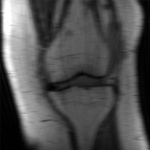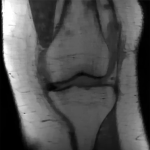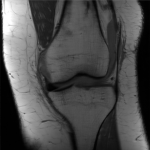
Having an MRI scan done can be an unpleasant experience. The procedure involves a patient lying down inside a large tube for at least 30 minutes, being instructed to remain motionless as magnetic, and radio waves create detailed pictures of their organs. Many find the machine’s loud, clanging noises disturbing, and feel panicky and claustrophobic.
An approach created by Puyang Wang, a doctoral candidate in electrical and computer engineering at the Whiting School of Engineering, may provide an answer. The solution, an algorithm that speeds up MRI data acquisition and results in clearer images, was selected among the winners at the “fastMRI” competition staged early this month by Facebook AI and New York University’s Langone Health. Two separate groups – one from the electronics company, Philips, and the other from the University of Amsterdam – joined Wang’s research in beings selected as the strongest projects from a field of thirty-four candidates.
The competition challenged groups to use Artificial Intelligence (AI) to improve the process of getting MRI scans. The hope was that by using AI to create accurate images from significantly less raw data, scans could be done as much as 10 times faster, improving patient experience and making the imaging procedure less expensive and more accessible.
For being selected as one of the winners, Wang will present his research at the Medical Imaging Meets NeurIPS workshop in Vancouver on Saturday, Dec. 14.
“This was a very exciting challenge for me,” Wang said. “What I like is that it is a very direct way to help the medical industry. This algorithm can easily be applied to MRI machines. It’s exciting to do this work, and see that the real world application of it could help a lot of people.”
Wang began this research during a summer internship with United Imaging Intelligence in Cambridge, MA. Upon returning to the Homewood Campus for this fall semester, he continued to optimize the solution for the challenge in collaboration with scientists from United Imaging Intelligence with support from Wang’s adviser, Vishal Patel, an assistant professor in ECE.
Wang devised an algorithm using a deep learning method called recurrent neural networks that creates clearer images that are obtained as a result of partial scans, which is a common approach to accelerate MRI data acquisition by taking fewer measurements, making the procedure quicker. Traditionally, partial scans produce subpar images that are difficult to analyze. However, using Wang’s algorithm, radiologists can get clear results while cutting down on a patient’s procedure considerably.
Wang is particularly excited that radiologists have approved his approach. Experts in the field contributed to the scoring in the “fastMRI” competition, and Wang’s algorithm received very high marks, which played a key role in it being selected as one of the best entrants.
“It’s really important to us that, in other words, our approach has been approved by the experts,” Patel said. “You can publish as many papers as you want, but if the doctors aren’t happy, your work won’t transition.”
Though the project did not start at Johns Hopkins, both Patel and Wang believe it is the perfect place to take it further. Patel envisions this algorithm, or one that is very similar to it, being implemented in a variety of medical techniques, including ultrasound and sonar imaging. His hope is that they will continue to improve the performance of imaging systems beyond MRI scans.
“Hopkins is the best place for this kind of research because we have one of the best medical schools, and we are able to collaborate with them,” Patel said. “We are looking forward to continuing our research in this direction, and solve some interesting problems. MRI is the first problem we tried, and it’ll only get better.”
- An image as acquired by a partial MRI scan.
- An image as acquired by a partial MRI scan and using compressed sensing algorithm.
- An image as acquired by a partial MRI scan and using Wang’s algorithm.


